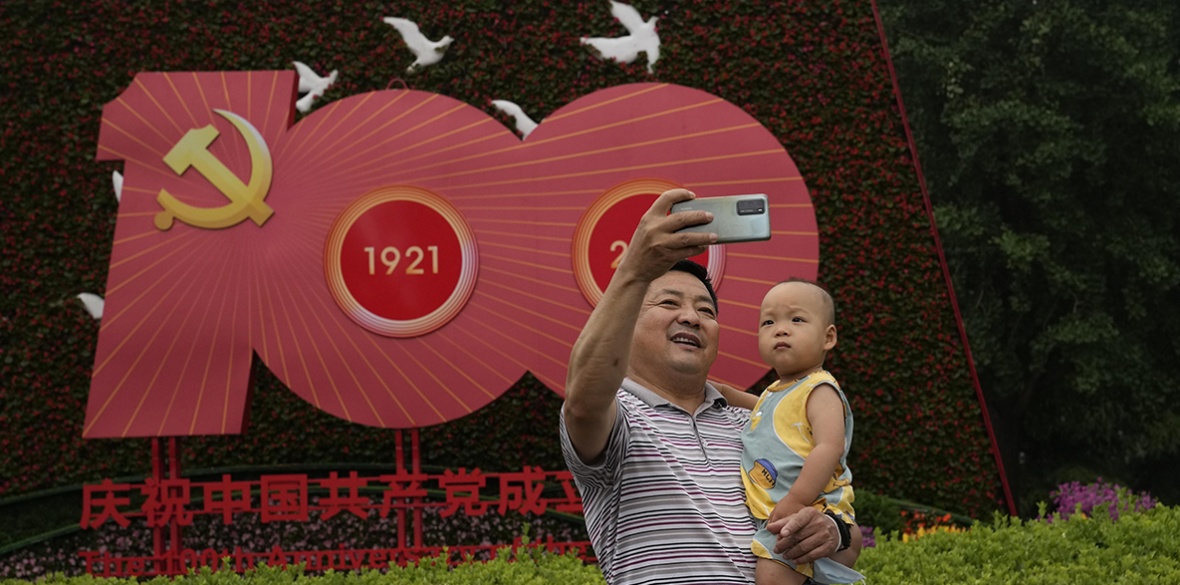This is the last article you can read this month
You can read more article this month
You can read more articles this month
Sorry your limit is up for this month
Reset on:
Please help support the Morning Star by subscribing here
THE 100th anniversary of the Chinese Communist Party has heightened resonance in the era of the new cold war.
There has been a dramatic shift in attitudes towards China in recent years. It is increasingly presented as a “systemic challenge,” in the words of a Nato communiqué.
From being depicted as a country whose rapid economic growth provided an example of the benefits of capitalist globalisation, China has become both an economic and a political enemy, its communist character once again highlighted as a menace by Western politicians.
Under Donald Trump the US revived rhetoric reminiscent of the first cold war, declaring the Chinese Communist Party a threat to “our freedoms.”
What’s changed? Liberal pundits say that China has become more assertive, more aggressive.
But changes in Chinese policy are more perceived than real. A willingness to attract foreign investment and technology from 1978 was always about developing China’s own productive capacity.
As China begins to edge ahead in multiple technological fields, Western corporations take umbrage that it aspires to be more than a vast pool of cheap labour, leading the US Information Technology Innovation Foundation to complain that it is no longer “a low-cost production platform for multinational corporations.”
Increasing hostility from the US is rooted in China’s failure to fold into a permanently subordinate position in a Washington-dominated world economy.
And it is when we contrast China’s development to that of other Third World countries that we can see how far from the truth is the liberal storyline that China since the 1980s has been a “post-communist” country enriched by embracing capitalism.
The truth is that Western “investment” does not enrich. US and European “investment” in Asia, Africa and Latin America has continued for decades — centuries — without narrowing the wealth gap.
Indeed, the control of resources and markets by transnationals based in the West maintains the division between a handful of rich countries and the “global South,” an apparatus of imperialist control policed by pro-corporate trade treaties, the World Bank and IMF, and in the last analysis military force and coups, as in Bolivia in 2019.
China’s economic miracle and historic achievement in eliminating poverty are not merely down to markets — India’s surrender to global transnationals has not provided similar growth rates or poverty reduction.
China’s success is a victory for economic planning, for state-led investment and for a government focus on popular welfare that has seen incomes rise consistently among all sectors of the population.
Nor have China’s leaders since 1978 distanced themselves from the earlier phase of socialist government under Mao Zedong, for all that “reform and opening up” has been depicted as abandoning communism; China’s Communist Party points, rightly, to the dramatic increase in life expectancy (from 36 to 65 between 1949 and 1976) as evidence that the Mao period was highly successful in raising living standards.
Attitudes to the Chinese Communist Party vary wildly on the Western left. We should avoid two traps: one, of ignoring the consistencies in China’s development since 1949 to paint its post-1978 course as anti-socialist, and two, internalising Western liberal political terminology to depict its Leninist political structure (the leading role of the Communist Party) as evidence that it cannot be democratic.
As the role of millions of Communist Party members despatched to China’s poorest regions in the recent poverty elimination campaign demonstrated, a mass party can be of and for the people.
China, unlike the Soviet Union, does not hold up its political system as a model for others. But we should stand up against imperialist narratives that seek to impose Western political models on China.
And we can recognise as the party marks its centenary that it can celebrate remarkable historic achievements, from the Long March and leading the resistance to Japanese occupation to spreading mass literacy and healthcare and directing China’s development into the advanced and increasingly prosperous country it is today.












